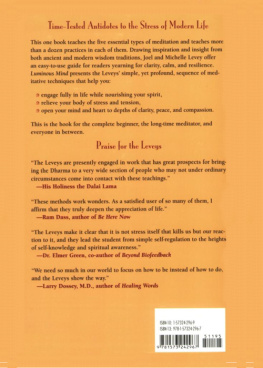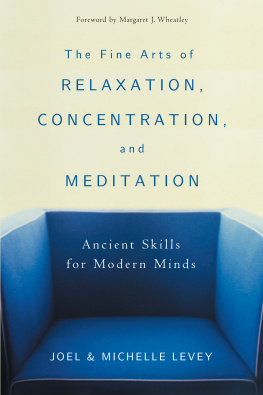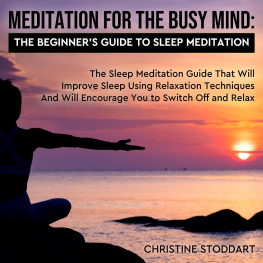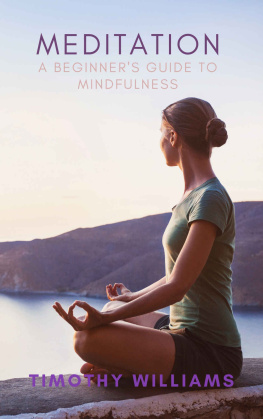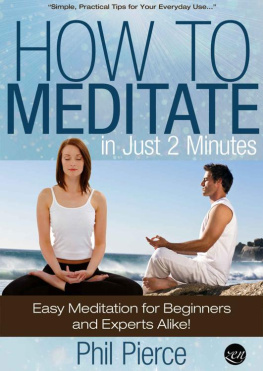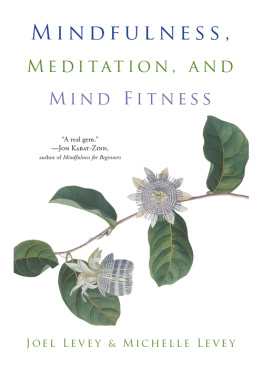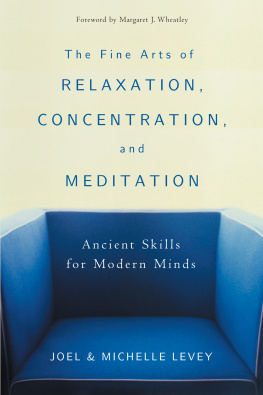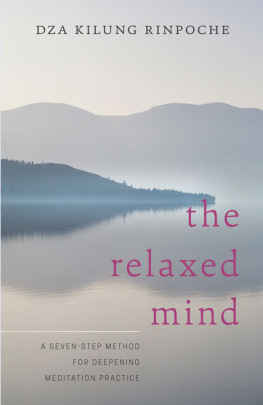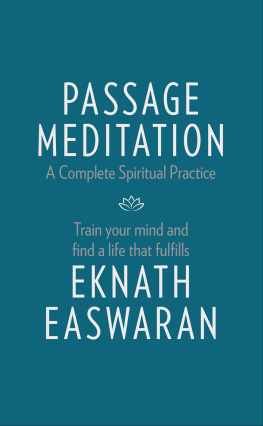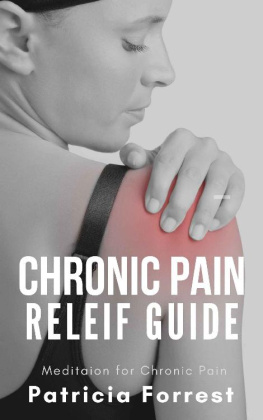PRAISE FOR THE LEVEYS
You are presently engaged in work that has great prospects for bringing the inner sciences to a very wide section of people who may not under ordinary circumstances come into contact with the inner technologies of mental development and transformation.
His Holiness the Dalai Lama
What a beautiful book! We need so much in our world to focus on how to be instead of how to do, and your book shows the way.
Larry Dossey, M.D., author of Healing Words
Luminous Mind is a skillful blend of time-proven antidotes to the stress of modern life.
Dan Goleman, Ph.D., author of Emotional Intelligence
In this beautifully done book, the Leveys have skillfully woven together contemporary insights into the value and need for meditation practice in our lives with a large number of extremely evocative suggestions for making use of different ways to practice relaxation, concentration, and meditation. A real gem.
Jon Kabat-Zinn, Ph.D., author of Full Catastrophe Living and Wherever You Go, There You Are, Center for Mindfulness in Medicine, Health Care, and Society (CFM) at the University of Massachusetts Medical Center
This book is an excellent primer for waking up. Practice these techniques and your life will change.
Richard Strozzi Heckler, Ph.D., author of The Anatomy of Change and Being Human at Work
The Leveys' book is a remarkably useful and important guide in a stressful age. Joel and Michelle free meditation from commonly held misconceptions and set it soaringfresh and joyfulinto the heart and mind of the modern-day spiritual explorer. It's meditation demystified. Pure and simple.
Peg Jordon, R.N., Editor In Chief, American Fitness Magazine
There is no question that relaxation and meditation are desperately needed in today's stressful society. The Leveys' book wisely emphasizes the need for relaxation and concentration exercises as skills needed to practice good meditation.
C. Norm Shealy, M.D., Ph.D., coauthor of The Creation of Health and Anatomy of the Spirit, Founder and Medical Director of Shealy Pain & Health Rehabilitation Institute
In this beautiful book, the Leveys condense two decades of study, experience, and teaching in the art of self-mastery. They make it clear that it is not stress itself that kills us but our reaction to it, and they lead the student from simple self-regulation to the heights of self-knowledge and spiritual awareness. Hopefully everyone who reads this book will make room in their life for the practices and growth program that it illustrates.
Dr. Elmer Green, coauthor of Beyond Biofeedback, Director of the Voluntary Control Program, Menninger Foundation
Perhaps the best aspect of this book is that it actually tells you what to do and how. It also explains in no-nonsense style why a certain approach is recommended and what benefit may be expected from its practice.
Esther-Margaret Hood, Hong Kong Post

This edition first published in 2006 by
Red Wheel/Weiser, LLC
With offices at:
500 Third Street, Suite 230
San Francisco, CA 94107
www.redwheelweiser.com
Copyright 1999 by Joel Levey and Michelle Levey. All rights reserved. No part of this publication may be reproduced or transmitted in any form or by any means, electronic or mechanical, including photocopying, recording, or by any information storage and retrieval system, without permission in writing from Red Wheel/Weiser, LLC Reviewers may quote brief passages. Originally published in 1999 as Simple Meditation and Relaxation by Conari Press. ISBN: 1-57324-151-2.
ISBN-10: 1-57324-296-9
ISBN-13: 978-1-57324-296-7
Library of Congress Cataloging-in Publication Data
Levey, Joel.
Simple meditation & relaxtion / Joel Levey and Michelle Levey.
p. cm.
Also published under title: Wisdom at work.
ISBN: 157324296-9
1. Meditation. I. Levey, Michelle. II. Title. III. Title: Luminous Mind
BL627.L48 1999
242cd21
9924221
Book and cover design by Donna Linden.
Typeset in Berkeley and Futura.
Cover photograph by Corbis Corporation. All visual media by Corbis
Corporation and/or its media providers. All Rights Reserved.
Printed in Canada
TCP
10 9 8 7 6 5 4 3 2 1
www.redwheelweiser.com
www.redwheelweiser.com/newsletter
To our many kind teachers
and to be the awakening wisdom
within us all.
CONTENTS
FOREWORD
WE LIVE IN A CULTURE WHERE STRESS has supplanted happiness as the most common state of mind. Despite the rapid growth in technology and availability of material goods, polls indicate that the typical midlife American is ten times more likely to be depressed than our grandparents were. The very things that are supposed to save time and give us the opportunity to relax and enjoy life are too often the cause of hassle and worry. The abundance of information, including the profusion of both paper and electronic mail, can be over whelming. The realization that the Earth's resources are perilously close to depletion and that population growth is now exponential fills many of us with angst. The response to this situation has largely been one of denial and business as usual.
Run faster, work harder, distract ourselves with television and movies, take stimulants and follow exercise regimens that are meant to relax us but often feel like one more task to fit into an overflowing schedule.
The simple truth is that we won't be able to heal the world until we can come to balance within ourselves. We can't even use our full creative potential or enjoy the blessing of intimate relationships when we are chronically worried and on overload. In the early 1900s, two Harvard physiologists, Robert M. Yerkes and John D. Dodson, discovered that a little bit of stress enhances performance, but too much stress is paralyzing. I ran a stress-disorders clinic at one of the Harvard Medical School teaching hospitals during the 1980s. Many of our clients came from the corporate world and were afraid that if they learned to relax and meditate, they would lose their edge. Most were surprised that their performance improved dramatically as they learned the kind of simple exercises that Joel and Michelle Levey describe so brilliantly in this book. Working at our edge means acquiring the tools that prevent us from going over the edge. And in the process, we learn unexpected and invaluable lessons about the nature of the human mind and the deep web of interconnections in which we live and move and evolve. As we begin to clear and focus the mind, senses become sharp and fresh, creativity explodes, we find ourselves inexplicably joyful, with the realization that life is an inexpressibly awesome and sacred gift. We learn to see with new eyes and recover the sense of wonder that we had as children.
Every spiritual leader has given similar advice. All human beings are alike. We all want to be happy. The road to happiness is a simple path, paved with actions that arise from the powerful intention to be kind and compassionate, just as we would wish others to behave toward us. A detractor once asked the first-century Rabbi Akiva to summarize the entire teaching of the Torah while standing on one foot. He replied that we should be kind to others and refrain from doing to them what we wouldn't want done to ourselves. Jesus, another first-century rabbi, gave exactly the same teaching. We know this as the Golden Rule, and while most of us would agree that it is a great idea, it is often hard to act with this degree of consciousness and caring. The true value of meditation becomes apparent over time, as kindness and caring become second nature. The fruits of practice are much more beneficial than lowered anxiety, better health, and enhanced performance. As we learn to let go of the extraneous chatter that clutters our mind, we discover that our true natureour essential selfis actually a center of awareness, peace, and compassion. Acting with loving kindness toward others becomes our authentic state of being rather than a mere external performance.

